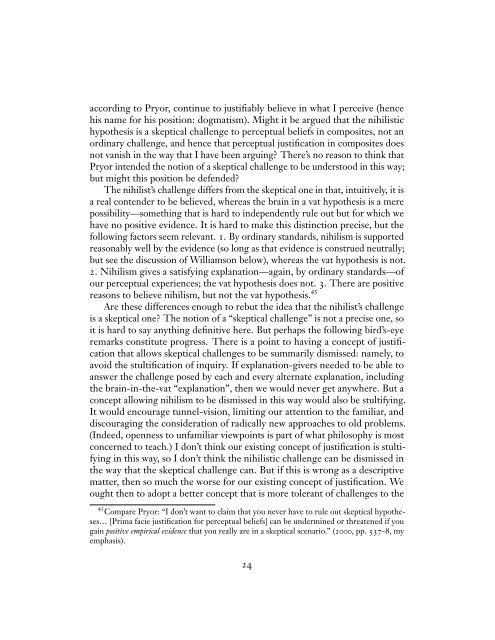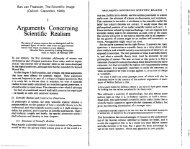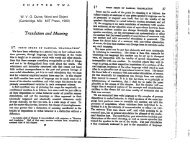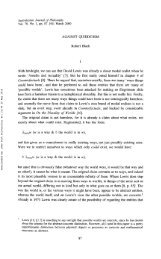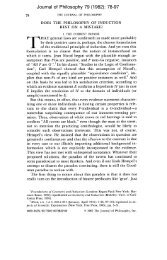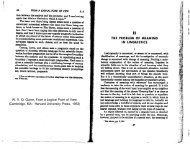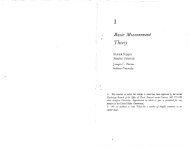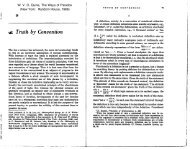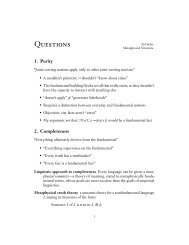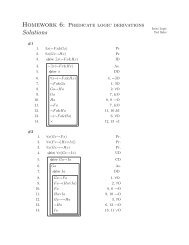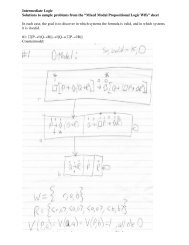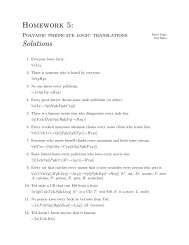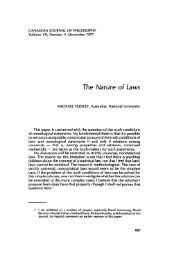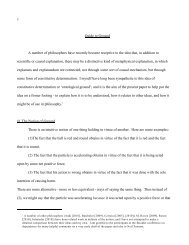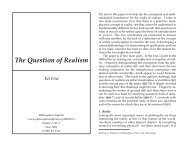Against Parthood∗ - Ted Sider
Against Parthood∗ - Ted Sider
Against Parthood∗ - Ted Sider
Create successful ePaper yourself
Turn your PDF publications into a flip-book with our unique Google optimized e-Paper software.
according to Pryor, continue to justifiably believe in what I perceive (hence<br />
his name for his position: dogmatism). Might it be argued that the nihilistic<br />
hypothesis is a skeptical challenge to perceptual beliefs in composites, not an<br />
ordinary challenge, and hence that perceptual justification in composites does<br />
not vanish in the way that I have been arguing? There’s no reason to think that<br />
Pryor intended the notion of a skeptical challenge to be understood in this way;<br />
but might this position be defended?<br />
The nihilist’s challenge differs from the skeptical one in that, intuitively, it is<br />
a real contender to be believed, whereas the brain in a vat hypothesis is a mere<br />
possibility—something that is hard to independently rule out but for which we<br />
have no positive evidence. It is hard to make this distinction precise, but the<br />
following factors seem relevant. 1. By ordinary standards, nihilism is supported<br />
reasonably well by the evidence (so long as that evidence is construed neutrally;<br />
but see the discussion of Williamson below), whereas the vat hypothesis is not.<br />
2. Nihilism gives a satisfying explanation—again, by ordinary standards—of<br />
our perceptual experiences; the vat hypothesis does not. 3. There are positive<br />
reasons to believe nihilism, but not the vat hypothesis. 45<br />
Are these differences enough to rebut the idea that the nihilist’s challenge<br />
is a skeptical one? The notion of a “skeptical challenge” is not a precise one, so<br />
it is hard to say anything definitive here. But perhaps the following bird’s-eye<br />
remarks constitute progress. There is a point to having a concept of justification<br />
that allows skeptical challenges to be summarily dismissed: namely, to<br />
avoid the stultification of inquiry. If explanation-givers needed to be able to<br />
answer the challenge posed by each and every alternate explanation, including<br />
the brain-in-the-vat “explanation”, then we would never get anywhere. But a<br />
concept allowing nihilism to be dismissed in this way would also be stultifying.<br />
It would encourage tunnel-vision, limiting our attention to the familiar, and<br />
discouraging the consideration of radically new approaches to old problems.<br />
(Indeed, openness to unfamiliar viewpoints is part of what philosophy is most<br />
concerned to teach.) I don’t think our existing concept of justification is stultifying<br />
in this way, so I don’t think the nihilistic challenge can be dismissed in<br />
the way that the skeptical challenge can. But if this is wrong as a descriptive<br />
matter, then so much the worse for our existing concept of justification. We<br />
ought then to adopt a better concept that is more tolerant of challenges to the<br />
45 Compare Pryor: “I don’t want to claim that you never have to rule out skeptical hypotheses…<br />
[Prima facie justification for perceptual beliefs] can be undermined or threatened if you<br />
gain positive empirical evidence that you really are in a skeptical scenario.” (2000, pp. 537–8, my<br />
emphasis).<br />
24


